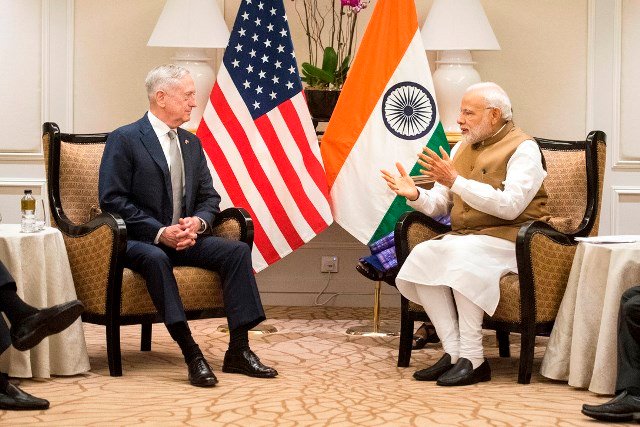Singapore 03 May 2018 Times of India
Prime Minister Narendra Modi met US Defence Secretary Jim Mattis in Singapore and discussed security related issues, days after the Pentagon renamed its Pacific Command as Indo-Pacific Command in a largely symbolic move to signal India’s importance to the US military.
Modi, who is here on the last leg of his three-nation tour, held a closed-door meeting with Mattis during which both sides discussed all security related issues of mutual and global interests, sources said.
National Security Adviser Ajit Doval was also present in the meeting that lasted for nearly an hour.
The meeting was held on the sidelines of the annual Shangri-La Dialogue which was addressed by the Prime Minister last night.
“The focus of conversation was on the region in the context of PM’s keynote address at the #SLD18 yesterday evening,” Ministry of External Affairs Spokesperson Raveesh Kumar tweeted.
In his keynote address, Modi had said an “Asia of rivalry” will hold the region back while an Asia of cooperation will shape the current century.
Asia and the world will have a better future when India and China work together with trust and confidence while being sensitive to each other’s interests, he had said.
“We should all have equal access as a right under international law to the use of common spaces on sea and in the air that would require freedom of navigation, unimpeded commerce and peaceful settlement of disputes in accordance with international law,” he had said.
Mattis also addressed the dialogue where he stressed upon freedom for all and “reaffirmation for rule based order”.
The meeting between the two leaders assumes significance as in his address Mattis has stressed upon both countries working together and with other nations for ensuring peace and security in the Indo-Pacific region.
“It is only appropriate that waterways remain open for all nations,” Mattis said.
The meeting comes days after the US renamed its oldest and largest military command – the Pacific Command – to Indo-Pacific Command, amid heightened tensions with China over the militarisation of the South China Sea.
The US move came in the wake of a series of measures by China that have raised tensions in the South China Sea.
China claims almost all of the South China Sea. Vietnam, Philippines, Malaysia, Brunei and Taiwan have counter claims over the area. The US also rejects China’s claims of ownership of the area.

Comments
Comments are closed.